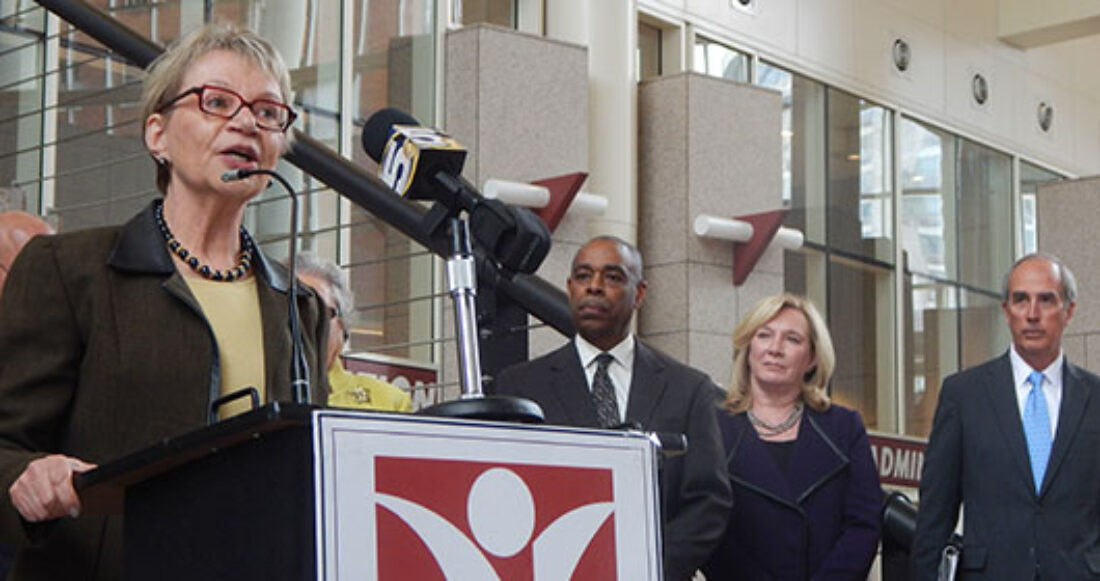Mobile, Alabama, Becomes Latest Evidence2Success Site

Mobile, Alabama, will become the latest city to implement an evidence-based framework designed by the Foundation to promote healthy child development and academic success. Joining the city of Selma. Mobile’s effort will focus initially on three neighborhoods: Maysville, the Martin Luther King, Jr. corridor and lower Dauphin Island Parkway.
The Casey Foundation’s Evidence2Success framework helps public system leaders and community residents work together to gather local data on the needs and strengths of youth. The coalition use the data to agree on youth well-being outcomes for improvement and realign public funding to address those needs with proven prevention programs. All of Mobile’s systems serving young people and families — including the Mobile County Public School System, the Mobile County Health Department, the Mobile County Juvenile Court and the Mobile Housing Authority — will be key partners in Evidence2Success, as will residents of the communities involved.
Evidence2Success will build on Mobile’s track record in bringing diverse partners together to improve the well-being of children and families. The Mobile Area Education Foundation (MAEF) will coordinate the local effort. The Yes We Can (YWC) Coalition, a MAEF initiative established in 2001 to serve as the collective voice for educational advocacy in the city, has generated conversations among more than 10,000 citizens, helping create shared expectations for school improvement. An existing Education Commission will serve as the mechanism for the creation of the Evidence2Success community board.
“We’re very excited by the collaborative spirit and energy that Mobile brings to Alabama’s efforts to strengthen the well-being of young people with evidence-based approaches,” said Suzanne Barnard, director of the Foundation’s Evidence-Based Practice Group.
“I am excited to have Mobile partner with the Annie E. Casey Foundation and the Alabama Department of Youth Services on the Evidence2Success framework,” said Mobile Mayor Sandy Stimpson. “Our community must care for its most precious resource, our children. We must make sure that what we do in support of our youth has a track record of success. Evidence2Success will help our community do just that.”
“MAEF is committed to improving education outcomes for all students in Mobile,” said MAEF CEO Carolyn Akers. “The partnership with the Annie E. Casey Foundation will allow us to continue our Yes We Can work that has helped focus and unite our community around providing a quality education for all kids.”
The Foundation will provide initial funding for evidence-based prevention programs in Mobile, with additional funding from MAEF and the Alabama Department of Youth Services. Beyond its grant dollars, the Foundation provides access to tools and technical assistance, including hands-on coaching, a youth survey to gather data on strengths and needs, public financing strategies and the Blueprints database of evidence-based programs to help communities implement Evidence2Success.
The Evidence2Success community board will begin its work by gathering data through the Youth Experience Survey, to be administered every two years to sixth, eighth, tenth and twelfth graders. The survey will assess the strengths and needs of local young people and set priorities for choosing programs. The data will be used to choose priority areas for improving well-being and to guide the board in selecting evidence-based programs that address those needs.
In addition to choosing the state of Alabama as an Evidence2Success partner, the Foundation announced Salt Lake County, Utah, as a site last year. Efforts there are focused on Kearns Township and several adjacent neighborhoods.
The Foundation introduced the Evidence2Success framework in two neighborhoods in Providence, Rhode Island, starting in 2012. Under the leadership of the Providence Children and Youth Cabinet, community and system leaders in those communities used data from the Youth Experience Survey to choose three priority areas: school absenteeism, anxiety and depression and delinquency. The group has chosen six evidence-based programs — three of which are underway and serving about 2,000 young people. The Children and Youth Cabinet recently received a state public health grant of up to $1 million to expand the use of those prevention programs over the next four years.






